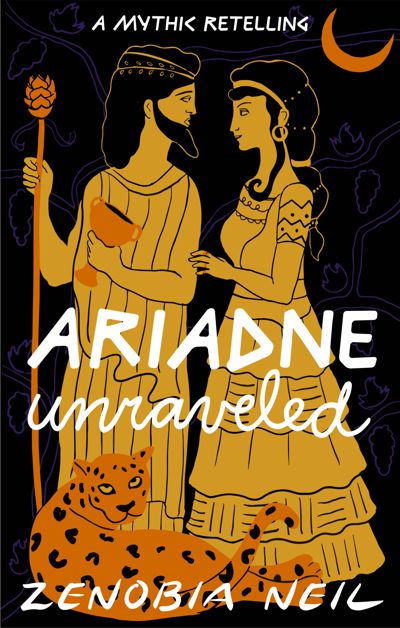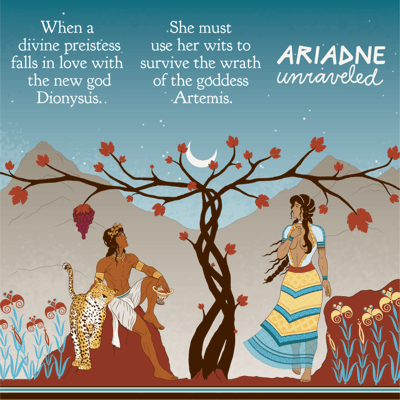
Ariadne, high priestess of Crete, grew up duty-bound to the goddess Artemis. If she takes a husband, she must sacrifice him to her goddess after no more than three years of marriage. For this reason, she refuses to love any man, until a mysterious stranger arrives on her island.
The stranger is Dionysus, the new god of wine who empowers women and breaks the rules of the old gods. He came to Crete seeking vengeance against Artemis. He never expected to fall in love.
Furious that Dionysus would dare meddle with her high priestess, Artemis threatens to kill Ariadne if Dionysus doesn’t abandon her. Heartbroken, the new god leaves Crete, vowing to become better than the Olympians.
From the bloody labyrinth and the shadows of Hades to the halls of Olympus, Dionysus must find a way to defy Artemis and unite with his true love. Forced to betray her people, Ariadne discovers her own power to choose between the goddess she pledged herself to and the god she loves.

Excerpt
Ariadne stood under a bright red canopy with her mother, father, and sister on a dais up the hill from the river. The black-sailed ship slowly wove its way down toward the palace. Did the black sails represent plague or sickness? That would be the ultimate revenge for Athens. Send a plague to Crete, wait for it to take hold, and attack the island. But if that were King Aegeus’s plan, why would he announce it with black sails? Perhaps the sails did not represent illness but sorrow.
Fourteen Athenian youths disembarked. The young women each wore a single plain garment that covered their breasts, while the young men wore shorter chitons. No matter how many times Athenians came, it always struck her as odd that men needed to cover their chests as well as women. She could understand that men feared the power of women’s breasts, but men’s breasts had no power. Still, what flesh she saw of these strangers did not disappoint. Despite being pale, the boys were well muscled. Their hair varied in shade from sand to tree bark, and one girl’s hair shone bright as amber.
The Athenians stared in awe at the grandeur of Knossos, the sun shimmering off their oiled hair. Unable to control their surprise, some of the boys craned their necks and gazed openmouthed at the grand structure.
Athens had no palace or temple to compare to Knossos. Foreigners always commented on the size of the buildings, as if they had been built by giants. Despite the anxiety in the pit of her stomach, Ariadne stood up straight, proud of her land and people.
Two of the young men seemed unable to shut their mouths until another boy patted their backs to prod them to join the group walking toward the raised platform. The Athenians murmured to each other in their language. Ariadne had learned Greek as well as some Egyptian and Phoenician as a girl. She could understand them, though she doubted they understood Minoan.
A youth with short, curly hair and broad shoulders strode toward them with a firm sense of purpose.
“If this is the king’s son, his name is Theseus,” Alexa whispered from behind. “They say he’s son of King Aegeus, but also of Poseidon.”
Ariadne put a hand to her lip to hide her smile. What foolishness! Every cuckold was told his wife had taken up with a god. No wonder it was easy for Medea to send him to his death. His claim endangered her own son, and Ariadne’s cousin would not have that.
“He was not raised in Athens,” Alexa continued. “He grew up in Troezen where his mother was the daughter of a king. They say King Aegeus left sandals and a sword under a boulder. If the boy could move it, he would show himself to be the chosen one.”
She could easily imagine the broad-shouldered Athenian moving a giant boulder. He was built like a wrestler, stocky and thick, so different from her own people. The sea salt and wind had undone some of the perfectly coifed hair he had surely been sent off with. His light brown hair fell to his shoulders in wavy locks. He appeared both royal and rugged.
Son of two fathers, a king and a god. He did not radiate divinity, yet there was a sense of ease about him, the kind that came with authority. Some of the Athenians wobbled toward them on unsteady feet. A chestnut-haired girl stumbled and fell. When she rose, Ariadne could tell she was trying not to cry as her throat and cheeks reddened in embarrassment.
How plain these sacrifices appeared standing before her own people. Her father grinned, regal in his robes of purple—more gold on one hand than the entire group of Athenians had together. King Minos even wore gold in his beard and wavy black hair. Pasiphae, Ariadne, and Phaedra wore gold strands entwined in their hair in addition to their jewelry. Even Alexa, a novice priestess, wore more jewels than these noble sacrifices. Aside from a few bronze rings, it appeared the Athenians were unadorned, though she noticed leather cords around their necks. Whatever they wore under their chitons was jewelry of protection rather than of status. Their parents had sent them off with prayers and baubles, knowing they would never see their children again.
Even without jewelry, they made an attractive group. Despite their fear and awe, they held their own appeal. King Minos eyed the beautiful girls, their limbs shining in the light. Queen Pasiphae kept her face impassive, but Ariadne did not doubt that several of these lovelies would warm her bed before their time to die.
Theseus walked toward the royal family on steady legs, leading the procession. “King Minos,” he said, bowing. “Queen Pasiphae.” He stood up straight and stared a moment too long. “Princess Ariadne. I am Theseus, son of Aegeus, at your service.”

Universal Amazon Link: https://books2read.com/u/bwolxG
Amazon UK: https://www.amazon.co.uk/dp/B09647R6CF
Amazon US: https://www.amazon.com/dp/B09647R6CF
Amazon CA: https://www.amazon.ca/dp/B09647R6CF
Amazon AU: https://www.amazon.com.au/dp/B09647R6CF
Meet Zenobia Neil

Zenobia Neil was named after an ancient warrior queen who fought against the Romans. She writes historical romance about the mythic past and Greek and Roman gods having too much fun. Visit her at ZenobiaNeil.com
Connect with Zenobia
Website: www.zenobianeil.com
Twitter: https://twitter.com/ZenobiaNeil
Facebook: www.facebook.com/zenobianeilauthor
Instagram: https://www.instagram.com/zenobia.neil/?hl=en
Pinterest: https://www.pinterest.com/zenobianeil
Book Bub: https://www.bookbub.com/profile/zenobia-neil
Amazon Author Page: https://www.amazon.com/Zenobia-Neil/e/B01KY86Q46
Goodreads: https://www.goodreads.com/author/show/15661007.Zenobia_Neil